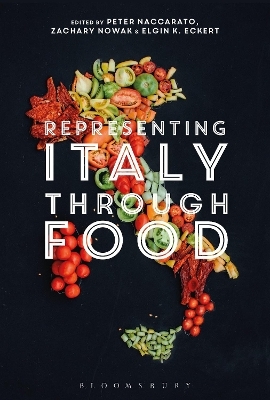
Representing Italy Through Food
Bloomsbury Academic (Verlag)
978-1-4742-8041-9 (ISBN)
Representing Italy through Food is the first book to examine how these perceptions are constructed, sustained, promoted, and challenged. Recognizing the power of representations to construct reality, the book explores how Italian food and foodways are represented across the media – from literature to film and television, from cookbooks to social media, and from marketing campaigns to advertisements. Bringing together established scholars such as Massimo Montanari and Ken Albala with emerging scholars in the field, the thirteen chapters offer new perspectives on Italian food and culture. Featuring both local and global perspectives – which examine Italian food in the United States, Australia and Israel – the book reveals the power of representations across historical, geographic, socio-economic, and cultural boundaries and asks if there is anything that makes Italy unique.
An important contribution to our understanding of the enduring power of Italy, Italian culture and Italian food – both in Italy and beyond. Essential reading for students and scholars in food studies, Italian studies, media studies, and cultural studies.
Peter Naccarato is Professor of English and World Literatures at Marymount Manhattan College, USA Zachary Nowak is Associate Director for the Food & Sustainability Program at The Umbra Institute, Italy Elgin K. Eckert is Assistant Professor for Italian and Cultural Studies at The Umbra Institute, Italy
List of Figures
Acknowledgments
Editors' Introduction: Presenting Food, Representing Italy
Peter Naccarato (Marymount Manhattan College, USA), Zachary Nowak, and Elgin Eckert (The Umbra Institute, Italy)
Part I: (Re)presenting Iconic Italy
1. The Belated Revenge of Today’s Farmers
Massimo Montanari (University of Bologna, Italy)
2. Authenticity all’italiana: Food Discourses, Diasporas, and the Limits of Cuisine in Contemporary Italy
Aliza Wong (Texas Tech University, USA)
3. Slow Food Movement and Facebook: The Paradox of Advocating Slow Living through Fast Technology
Ginevra Adamoli (Independent Scholar, Italy)
Part II: Representing Italy in Literature and Film
4. Casalinghitudine: Recipes for Political History
Ernesto Livorni (University of Wisconsin-Madison, USA)
5. Inspector Montalbano a tavola: Food in Andrea Camilleri’s Police Fiction
Elgin Eckert (The Umbra Institute, Italy)
6. There’s a Mobster in the Kitchen: Cooking, Eating, and Complications of Gender in Mafia Movies and Television
Peter Naccarato (Marymount Manhattan College, USA)
7. In cibo veritas: Food Preparation and Consumption in Ozpetek’s “Queer” Films Elgin Eckert and Zachary Nowak (The Umbra Institute, Italy)
Part III: Marketing, Packaging, and Advertising Italy
9. Semiotics of Sauce: National Identity and Naming of Pasta Sauces Maryann Tebben (Bard College, USA)
10. Producing Consumers: How 1950’s Food Advertisements in La cucina italiana Evoke and Create Gendered Bodies Diana Garvin (Cornell University, USA)
11. A Kitchen with a View: Perspectives on Italian Gender Roles in Barilla Food Commercials 1950-1970 Antonella Valoroso (The Umbra Institute, Italy)
Part IV: Global Representations of Italy
12. Italian Food in the United States Ken Albala (University of the Pacific, USA)
13. Leggo’s not-so-Autentico: Toward an Alternative Account of 20th Century Italo-Australian Foodways Rachel Ankeny & Tania Cammarano, University of Adelaide, Australia
14. Italian Food in Israel: Stuffing Up in an Imagined Mediterranean Nir Avieli (Ben Gurion University, Israel)
15. Afterword: Italy Represented Peter Naccarato (Marymount Manhattan College, USA), Zachary Nowak, and Elgin Eckert (The Umbra Institute, Italy)
Bibliography
Index
| Erscheinungsdatum | 09.03.2017 |
|---|---|
| Zusatzinfo | 20 bw illus |
| Verlagsort | London |
| Sprache | englisch |
| Maße | 156 x 234 mm |
| Gewicht | 615 g |
| Themenwelt | Sozialwissenschaften |
| ISBN-10 | 1-4742-8041-2 / 1474280412 |
| ISBN-13 | 978-1-4742-8041-9 / 9781474280419 |
| Zustand | Neuware |
| Haben Sie eine Frage zum Produkt? |
aus dem Bereich


